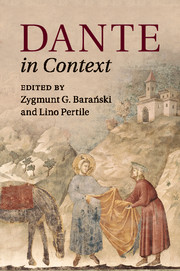Book contents
- Frontmatter
- Dedication
- Contents
- List of illustrations
- List of maps
- Notes on contributors
- Chronology
- Abbreviations and note on translations
- Introduction
- Part I Politics and society
- Part II Intellectual traditions
- 9 Philosophy and theology
- 10 Moral philosophy
- 11 Natural philosophy
- 12 Medicine
- 13 Islamic and Jewish influences
- 14 Cosmology, geography, and cartography
- Part III Linguistic and literary cultures
- Part IV Visual and performative culture
- Part V Dante: life, works, and reception
- Further reading
- Index
10 - Moral philosophy
from Part II - Intellectual traditions
Published online by Cambridge University Press: 05 October 2015
- Frontmatter
- Dedication
- Contents
- List of illustrations
- List of maps
- Notes on contributors
- Chronology
- Abbreviations and note on translations
- Introduction
- Part I Politics and society
- Part II Intellectual traditions
- 9 Philosophy and theology
- 10 Moral philosophy
- 11 Natural philosophy
- 12 Medicine
- 13 Islamic and Jewish influences
- 14 Cosmology, geography, and cartography
- Part III Linguistic and literary cultures
- Part IV Visual and performative culture
- Part V Dante: life, works, and reception
- Further reading
- Index
Summary
Dante terms ‘moral philosophy’, ‘moral science’, and ‘moral doctrine’ the ‘part’ of ‘wisdom’ (Conv. III, xv, 14) that establishes what is good, how human beings should act, and which kind of life is best for them. When he speaks of ethica (in Latin) and etica (in Italian), he instead generally refers to a clearly identified text, namely the Nicomachean Ethics, the only Aristotelian work devoted to this branch of learning that was known during the Middle Ages, apart from a compilation of short passages from the Magna moralia (Great Ethics) and the Eudemian Ethics called Liber de bona fortuna (Book of Good Fortune). Dante's terminological precision is significant, but should not be overstated. Of course, one cannot approach the treatment of ‘ethics’ in his times without bearing in mind that a variety of sources for discussing moral problems were available, and that there existed a plurality of paradigms of moral philosophy and theology. This means that Dante's own views on ethical issues cannot be properly understood without recognizing that he was influenced – directly or indirectly – by Latin moral thought, in particular Cicero (106–43 BCE) and Seneca (c.1 BCE–CE 65; called ‘moral Seneca’ in Inf. IV, 141); by the Roman juridical tradition; by the Bible and the Church Fathers, beginning with Augustine (354–430); by Boethius' (c.475/77–526?) Consolatio philosophiae (Consolation of Philosophy, c.524); by Christian moral compilations such as the Formula vitae honestae (Form of Honest Living) composed by Martin of Braga (c.520–80) between 570 and 579; by the classifications of sins elaborated by Cassianus (c.360–435) and Gregory the Great (c.540–604) and developed in compendia for preachers and in treatises on vices and virtues; by Giles of Rome's (c.1243–1316) De regimine principum (On the Government of Rulers, 1277–81), quickly translated into Italian; and by the moral sections of theological summae. Nevertheless, the fact remains that for Dante, as well as for his contemporaries, the study of a discipline meant in the first place the study of the book that had laid its foundations. And as we shall see, from the thirteenth century onwards all agreed that the Nicomachean Ethics was the ‘handbook’ for teaching moral philosophy.
What is more, the Nicomachean Ethics – ‘your Ethics’, as Virgil says to Dante in Inferno XI, 80 – was one of Dante's livres de chevet.
- Type
- Chapter
- Information
- Dante in Context , pp. 159 - 172Publisher: Cambridge University PressPrint publication year: 2015
- 3
- Cited by



